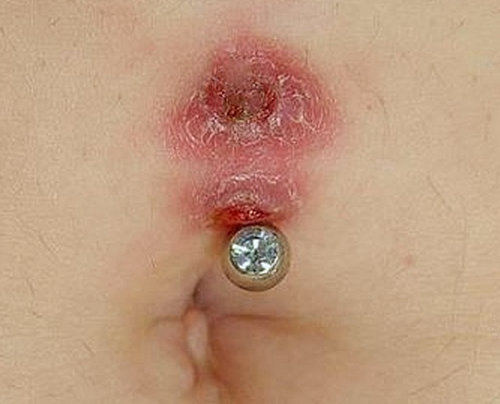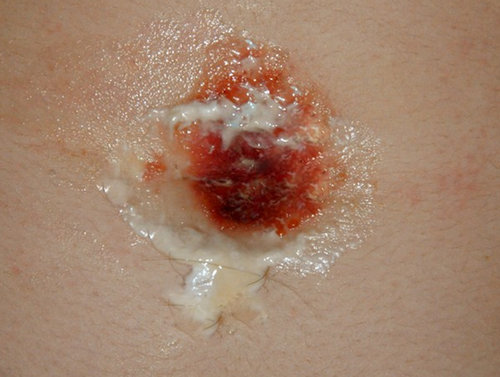Why Does My Belly Button Smell?
Had you experience a smelly belly button? Are you wondering what causes the foul smell?
From a medical standpoint, a smelly belly button could mean the presence of discharge due to unsanitary practices. If there is a distinct offensive smell, then it could indicate an ongoing infection.
People with belly button piercings are susceptible to smelly discharges. If the navel or belly button appears to be moist, warm, and smelly, it should be addressed right away.
What are the causes of smell belly button?
- Poor hygiene
- A developing wound
- Could suggest fungal infection
- Improper healing of the belly button secondary to piercing
- Sweat and dirt build up
- Bruised skin in the navel

Picture 1 : An image of an infected belly button secondary to piercing.
Image Source : gudhealth.com

Image 2: A belly button with stinky discharges.
Photo Source : heydoctor.org
Smelly belly button as a result of yeast or fungal infection
A smelly belly button is commonly associated with yeast infection. Candida albican loves to thrive in warm and moist environment, which leads to foul smell. There is also pain along with liquid discharges that is yellowish in color. The smell won’t go away even after washing. (1)
Smelly belly button during pregnancy or menstrual period
Is your belly button smelly when you are having your period or when you are pregnant? If yes, then there is a physiologic explanation to that. During your menstrual cycle or pregnancy, your body’s metabolism increases significantly, which makes you prone to sweating. If you are not the type of person who cleanses her navel regularly, moisture will build up which causes foul odor. (2, 3, 4)
A smelly bell button after undergoing surgery
Many people who recently undergone a surgery noticed that their belly button has foul smell. This mostly happens to people who just had tummy tuck or laparoscopy. Surgery usually leaves scabs on the skin, which causes the belly button to somehow emit an unpleasing smell.
Smelly navel secondary to diabetes and high blood pressure
Diabetes and high blood pressure can cause havoc to the health of your navel. These conditions could result to fishy or rotten cheese smell. There are discharges that look like cottage cheese.
A belly button that smells like anus or fecal matter
Is your belly button smell like a bowel movement? If it smells like poop, it can be an indicator that the dead skin cells are rotting in the navel. This leads to accumulation of bacteria in the navel leading to foul smell. (3, 6)
How to prevent a smelly belly button?
There are many things you can do to prevent smelly belly button. These include the following:
- When you take a bath, you have to make sure you wash you navel and rinse properly.
- After performing strenuous activities such as exercising, make sure you clean your navel to prevent the accumulation of sweat.
- Keep your belly button dry at all times. Bad microorganisms thrive in warm and moist environment and your belly button can be a perfect thriving ground if you don’t keep it clean. (1, 2)
How to treat a smelly belly button?
If there is something wrong in your belly button, the best thing to do is to see your doctor right away. The doctor will thoroughly assess your condition and will determine the right course of treatment. For mild infection, the doctor will recommend topical creams.
However, severe infection requires topical creams and ingestible antibiotics. Other treatment methods include the following:
- An antifungal cream is used to treat a smelly navel, especially if it is caused by a yeast infection.
- If the source of the infection is bacteria, the doctor will recommend a topical antibacterial cream. (1)
When is surgery needed?
A surgical approach is deemed necessary when the patient has patent urachus. The urachus is a part of the channel between the belly button and the bladder. It drains the urine in the fetus on the first trimester of pregnancy. In the 12th week of gestation, the urachus closes and obliterates.
All that is left is a tiny fibrous cord, which is medically known as the median umbilical ligament. A patent urachus occurs when the urachus did not totally seal off. It causes the urine to leak at the umbilicus, which causes a foul smelling belly button. To correct this problem, a surgery is required. (4, 5)
How to get rid of smelly belly button at home?
- To get rid of smelly belly button, you should begin with keeping your navel clean at all times. When cleansing the area, you have to use salt water or saline solution. It helps absorb excess moisture. Make it a habit to clean the navel regularly and pat dry to prevent moist.
- As much as possible, you have to avoid applying creams or lotions in the belly button. They make the navel moist thereby attracting harmful microorganisms.
- Cleaning the belly button with a rubbing alcohol helps, but make sure you will not put too much rubbing alcohol. The proper way of cleansing is dipping the cotton ball in a rubbing alcohol. Swab the cotton in the belly button two times a day to prevent foul smell.
- If there is an ongoing infection in the belly button, you can somehow get rid of it by using tea tree oil. This oil is known for its antibacterial and antifungal properties. It hastens healing of the navel infection.
- If there is redness and the navel appears sore, you can alleviate the redness and swelling through warm compress. (6, 7)
If you keep the belly button clean and dry at all times but still there is an odd smell that seems to not go away, then the best thing to do is to consult your doctor. A recurring infection could indicate a more serious problem that warrant immediate medical attention.
As mentioned above, a course of treatment which includes topical and ingested drugs will be used to thoroughly get rid of infection. If there is a severe infection, you have to avoid putting anything on the belly button. Do not self-treat, especially if you are not so sure of what you are doing.
You could inflict more harm than good. If the infection won’t go away, the best thing to do is to consult your doctor. (7)
References:
- www.medguidance.com
- www.treatcurefast.com
- www.livestrong.com
- www.isitnormal.com
- www.newhealthadvisor.com
- www.healcure.org
- www.zocdoc.com